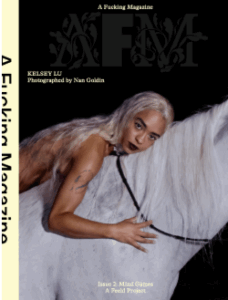
On the Writer of Erotic Harry Potter Fan Fiction Who Messaged Me First
Orlando Reade Explores the Intersection of Technology, Desire and Uncanny Doppelgangers
Last month I received a message that said: I am about to write you a very insane email. Before I could think, my thumb had opened the app. The message continued: Please be kind. I loved your book.
I have received some insane messages in my time, but few have been this self-aware. I clicked onto the profile: an attractive American woman with good politics, a boyfriend, and an appetite for high-brow literary non-fiction. She didn’t look dangerous.
When you have written a book about Paradise Lost, a centuries-old Biblical poem, you don’t expect to have many readers, let alone enthusiastic ones. I did not want to discourage even a very insane email from someone who had loved my work. I sent her a kind response and soon we were chatting.
He looked like a Harry Potter character—part Draco Malfoy, part Harry Potter. He also looked, I thought, a strange feeling in my stomach, a little like me.
She soon revealed the content of her very insane email. She told me that she was the author of a book-length work of Harry Potter erotic fan fiction, and had taken its title from Paradise Lost, the same quote I had used for the title of my book.
are you mad at me for fucking up your SEO, she asked.
The meaning of this dawned on me: anyone who Googles my exhaustively researched reception history, What in Me is Dark: The Revolutionary Life of Paradise Lost, will also come across her fan fiction novella, What in Me is Dark, Illumine, written under the pseudonym telleli.
telleli is quite popular in the erotic fan fiction multiverse: thousands of readers shower her in praise as they wait for the next installment. Even as she seemed to enjoy her violation of my search results, she tried to console me:
i mean, like. we’re all just part of the great literary, liberatory tradition you described
She was right. My book had argued that the creative interpretation of classic texts can be liberatory. Readers exercise a democratic freedom by identifying with Milton’s seductive Satan rather than his rather wooden God, rewriting his work to find their own version of freedom in it. This was potentially no less true of Harry Potter.
Over the next month, I read her novella. It takes place decades before Harry Potter’s birth. The young Lord Voldemort, then called Tom Riddle, is a student at Hogwarts School, world domination a glimmer in his cold blue eye. He develops a rivalry with a new boy, named Hadrian Peverell, a rivalry that is also a broiling, unspeakable sexual chemistry.
For thirty-one chapters, telleli masterfully edges the reader. The two boys are drawn together again and again by the embarrassing electricity of adolescent desire, their dueling wands barely symbolic substitutes for the sex that they both so badly want but can hardly articulate.
As I read it, I wondered about telleli. Why had she decided to write about these two men? I thought of her boyfriend: bespectacled, blonde, and boyish. He looked like a Harry Potter character—part Draco Malfoy, part Harry Potter. He also looked, I thought, a strange feeling in my stomach, a little like me.
At the end (plot spoiler), we find out that Hadrian Peverell is, in fact, Harry Potter. He has traveled back in time to kill Voldemort, hardly expecting that, having assumed the body of a teenager, he would develop the desire to explore the future Dark Lord’s youthful body.
Sex between good and evil characters is a common plotline in Harry Potter fan fiction. The Harry Potter-Tom Riddle plotline is known as tomarry. There’s also drarry (Draco Malfoy and Harry), dramione (Draco and Hermione), snarry (Severus Snape and Harry), and most controversially, snamione, the sadistic teacher and his eager student, a plotline that has courted accusations of child abuse in certain Reddit threads. In some stories, telleli told me, good dick is morally transformative; other times, evil dick corrupts.
This sent me into an academic reverie. I figured that these erotic rewritings have a new meaning now that J. K. Rowling has morphed into a kind of aunty Andrew Tate. This spring, the author posted a picture of herself celebrating the U.K. Supreme Court verdict against trans rights with a cigar on her superyacht, her face clenched like a fist.
Writers like my fan fiction friend are re-enchanting a cherished object: infusing it with an uncontainable desire.
Many believe that Rowling has betrayed the values promoted in the Harry Potter books, and this fact drives some of the erotic rewritings. If you don’t like the politics of an author, you can just rewrite their work. In March 2025, Azealia Banks, the Alexander Pope of the Alexa era, invented a backstory to explain Rowling’s villain arc:
Maybe her husband at 27 cheated on her with a Trannylicious diva and that’s why she’s dedicated every waking moment to making sure her life’s legacy is harassing people who make up less than 1% of the global population.
As well practiced in brujeria as in Twitter, Azealia understands that fiction is a wand that can cast bad luck on her enemies. By contrast, writers like my fan fiction friend are re-enchanting a cherished object: infusing it with an uncontainable desire, collapsing the author’s false binaries like the columns of the temple on the heads of the Philistines.
When I told telleli I had finally come to the end of her novella, she informed me that what I had read was only the first half of the full work, which she has meticulously planned and expects to run to two hundred thousand words.
Then she added:
i’m obsessed with you consistently calling it a novella
i mean this with the utmost fondness and respect but you are phd-pilled
i am literally writing gay porn
__________________________________
Feeld Releases Issue 2 of AFM: (A F*cking Magazine / A Feeld Magazine)
Feeld, the dating app for the curious, launches AFM Issue 2: Mind Games. The iconic print publication returns to newsstands, featuring cover star Kelsey Lu photographed by Nan Goldin. This issue, titled Mind Games, explores the puzzles our thoughts create—how they shift, deceive, and reshape across love, memory, and identity. With essays, fiction, photography, and poetry from leading contemporary voices, the issue takes on affirmations, revisions, and the rewrites we make to our own stories, turning assumptions inside out. AFM Issue 2 continues Feeld’s mission to expand conversations around intimacy and culture, asking readers to look closer. And then look again.

“My Evil Sexy Doppelganger” by Orlando Reade appears in the latest issue of AFM: A F*cking Magazine.
Orlando Reade
Orlando Reade studied at Cambridge and Princeton, where he received his PhD in English literature in 2020. For a period of five years, he taught in New Jersey prisons. He is now an assistant professor of English at Northeastern University London. His writing has appeared in publications including The Guardian, Frieze, and The White Review, where he also served as a contributing editor.


















